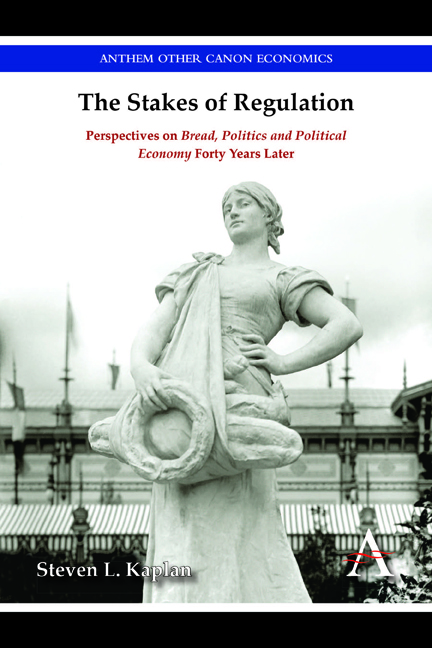Book contents
- Frontmatter
- Dedication
- Contents
- Introduction
- Chapter I (Re-)Thinking Regulation: Police, Prices, Markets
- Chapter II Agriculture and the French Economy of the Old Regime
- Chapter III Collective Action and Its Actors: The Moral Economy and the Market, the People and the Elites, Disorder and Order
- Chapter IV The Parlements in the Age of Economic Enlightenment
- Chapter V Kings and Ministers: Politics and Policies, Finance and Subsistence
- Chapter VI The New Historiography of Political Economy
- Chapter VII Famine, Dearth and Food (In-)Security
- Afterword
- Index
Chapter VII - Famine, Dearth and Food (In-)Security
Published online by Cambridge University Press: 20 July 2018
- Frontmatter
- Dedication
- Contents
- Introduction
- Chapter I (Re-)Thinking Regulation: Police, Prices, Markets
- Chapter II Agriculture and the French Economy of the Old Regime
- Chapter III Collective Action and Its Actors: The Moral Economy and the Market, the People and the Elites, Disorder and Order
- Chapter IV The Parlements in the Age of Economic Enlightenment
- Chapter V Kings and Ministers: Politics and Policies, Finance and Subsistence
- Chapter VI The New Historiography of Political Economy
- Chapter VII Famine, Dearth and Food (In-)Security
- Afterword
- Index
Summary
Probably no single issue poses the question of regulation more starkly than that of famine. An apocalyptical happening, famine places drastic strain on every system that underpins a social organization. Despite a long tradition of rejection of the naturalistic explanation, famine is characteristically the product, at least in substantial part, of grave and/or cumulative “agro-meteorological” disturbances. Famine may be simultaneously engendered or aggravated by market failure (severe exchange and distributional inefficiencies), social failure (a breakdown of cohesion), or political failure (a paralysis or abuse of power, and/or a breakdown or deficiency of regulation).
The Grim Reaper portends death the way politics (fore)shadows famine (or “merely” dearth). Culturally diverse in its performance, the Grim Reaper can in some cases actually cause the victim's death, just as politics can be plausibly called to account for the intensification and extension of famine, if not for its (technical) genesis, and for the horrors and hecatombs that follow in its wake. The irony of the Grim-Reaper motif is particularly chilling in reference to the dyad politics–famine because its central image evokes a harvester, associated in good times with the gathering of foods of first necessity, with survival if not festivity. Flourishing a scythe, the Grim Reaper harvests death rather than abundance, even as politics often dispenses indifference and mistreatment rather than succor and security.
I construe regulation, in a broad sense, as the intervention of the state, or other branches of public authority, in the name of some fundamental principles bearing upon the social bond, such as justice, equity and/or solidarity, to prevent or repair harm incurred by various members of the community as a consequence of acts committed by other members, or by outsiders, or as a result of acts considered as natural disasters (according to the formula commonly understood today).
- Type
- Chapter
- Information
- The Stakes of RegulationPerspectives on Bread, Politics and Political Economy Forty Years Later, pp. 335 - 384Publisher: Anthem PressPrint publication year: 2015



